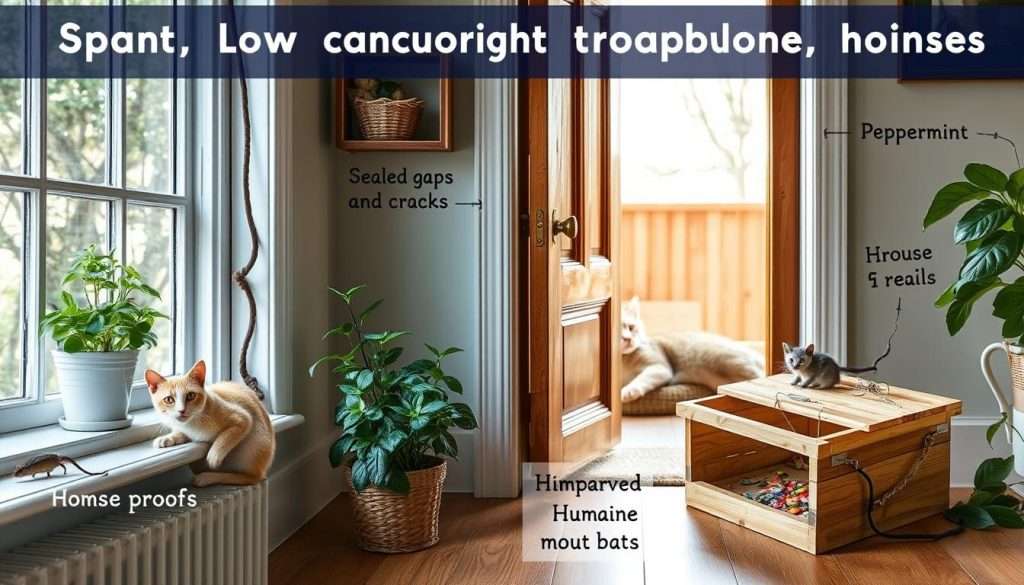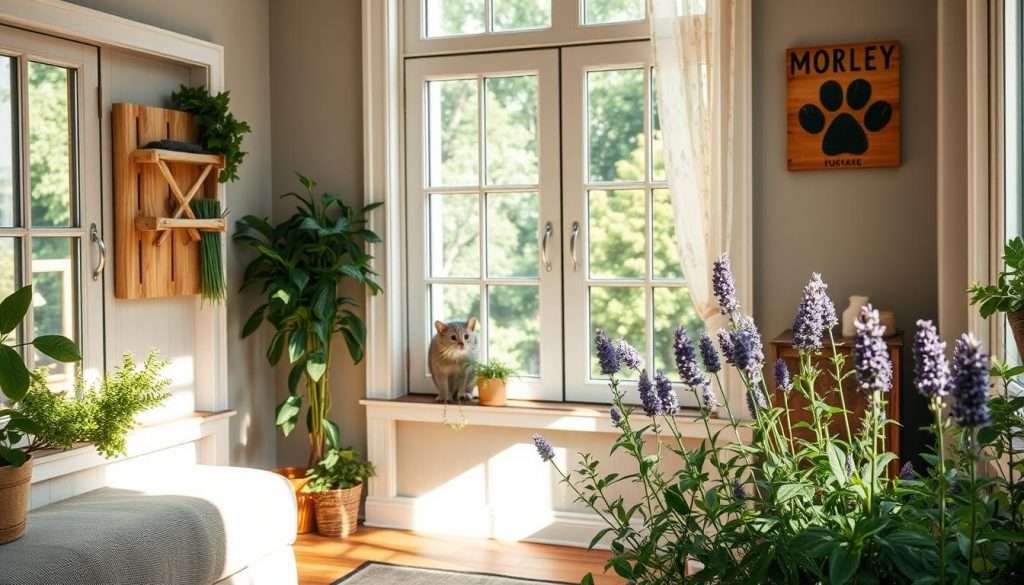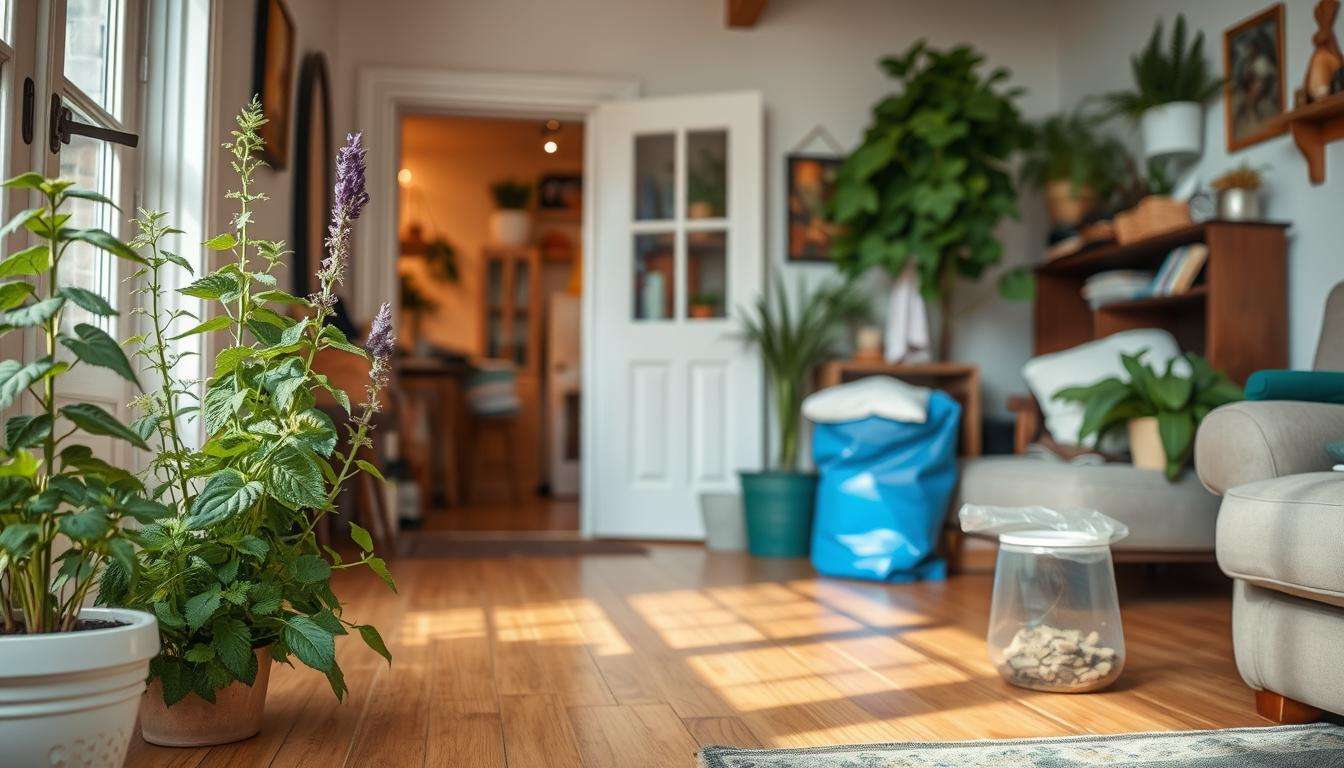Mice can be a big problem, especially when it’s cold. They look for warmth and food in our homes. To keep them out, we need to use natural ways to prevent them.
We’ll learn what draws mice to our homes. We’ll also find out how to keep them away. This includes using things like peppermint oil and cayenne pepper. Also, we’ll talk about how to keep food safe from mice.
Key Takeaways
- Mice are nocturnal and search for food and warmth, especially in the colder months.
- Sealing entry points is crucial, as mice can fit through holes the size of a dime.
- Removing food sources and securing pet food can significantly reduce mouse attraction.
- Natural repellents, such as peppermint oil and cayenne pepper, can deter mice effectively.
- Regular monitoring and maintenance will keep your home pest-free.
Understanding Mouse Behavior
Knowing how mice behave is key to controlling them. Figuring out why mice like certain places helps homeowners stop them. Mice are most active at night, making it hard to spot them until it’s too late.
The Nocturnal Nature of Mice
Mice come out at dusk. They look for food and places to hide at night. This love for darkness helps them sneak into our homes. You might see gnaw marks or droppings in places like the kitchen.
Mouse Attraction Factors
Mice seek out food and shelter easily. Bad cleanliness makes homes more appealing to them. They like:
- Dirty kitchens with food out
- Uncovered pet food
- Too much greenery around the house
Cracks and gaps in buildings let mice in. It’s important to check your home well. Knowing this helps us keep our homes clean and mouse-free. For more tips, check this resource.
Identifying Signs of a Mouse Infestation
Spotting a mouse problem early can prevent big issues. Mice can damage your property and spread diseases.
Common Indicators of Mice
Look for these signs to spot mice:
- Droppings: Mouse droppings are ¼ inch long and rod-shaped. A single mouse can leave 50 to 80 droppings in one night.
- Tracks: Mice leave tracks, especially in dusty places. Use flour to find small dots where mice have been.
- Grease Marks: Look for oily marks or tiny footprints near entry points. These are easier to see with a flashlight.
- Gnawing Damage: Check for chewed wood, paper, and plastic. Mice can make small holes as they get in.
- Urine: Mouse urine smells like ammonia. This smell gets stronger with more mice.
Assessing Mouse Damage
Mouse damage isn’t just about property. It can also lead to expensive repairs due to chewed wiring. This is a fire hazard.
- Mice holes are as small as 1/4 inch. They make sneaky entrances.
- Big damage to furniture or belongings shows a bigger problem.
- Visible nests from shredded paper or fabric are a clear sign of mice nearby.
Watching for mouse signs can save you from big damage. It keeps your home healthy.
How to Keep Mice Out of Your House
To keep mice out, start by removing their food sources. A few simple steps can help a lot. These steps make your home less welcoming to mice, keeping it cozy and safe.
Removing Food Sources
Mice love easy food. By removing their food, you make your home less appealing. Here are some good ways to do this:
- Store all food in airtight containers to keep mice away.
- Throw away trash often and clean up spills right away. These can attract mice.
- Keep compost bins at least 100 feet away from your house.
- Don’t let pets eat from bowls left out all night.
- Clear out storage areas often to remove hiding spots.
Securing Pet Food
Food for pets can also attract mice. Here’s how to keep pet food safe:
- Use strong, sealed containers to keep mice out.
- Keep pet food off the ground to stop mice from getting it.
- Place pet food dishes in open areas, away from corners and walls.
By removing food sources and securing pet food, you can keep mice away. This makes your home a less welcoming place for them.
| Strategy | Description |
|---|---|
| Store Food Properly | Use airtight containers for all food products, including pet food. |
| Regular Cleaning | Promptly clean up crumbs and spills to eliminate food sources. |
| Declutter | Remove unnecessary items that may serve as nesting sites. |
| Distance Compost | Keep compost bins far from the house to prevent attraction. |
| Proper Pet Food Storage | Store pet food in sealed containers and away from typical entry points. |
Effective Mouse-Proofing Techniques
Keeping your home mouse-free is key. Mice can fit through tiny spots. So, it’s crucial to block their entry points. Here are some ways to close holes and seal gaps to protect your home.
Closing Entry Points
To keep mice out, find and block their entry spots. They can slip through holes as small as a dime. Here’s how to make your home secure:
- Look over your house’s outside for holes and gaps.
- Use heavy or 16-gauge wire mesh to cover big holes. Make sure gaps are no bigger than 1 cm x 1 cm.
- Seal small cracks with caulk or expanding foam for a tight seal.
Sealing Cracks and Gaps
Sealing gaps inside is also key. Rodents like food and places to hide. To seal cracks and gaps:
- Check doors and windows for wear signs.
- Fill gaps around utility lines and pipes.
- Make sure vents and chimneys have screens to block entry.
By blocking entry points and sealing gaps, you’ll make your home mouse-proof. These steps not only keep mice away but also prevent damage from their chewing. This can save you from costly repairs or fire hazards.

| Material | Use for | Protection Level |
|---|---|---|
| Heavy wire mesh | Covering holes | High |
| Caulk | Sealing smaller cracks | Medium |
| Expanding foam | Sealing utility gaps | High |
Using these methods can greatly lower the chance of rodent problems. Acting now will give you peace of mind and a mouse-free home.
Natural Mice Repellents and Deterrents
Using natural mice repellents can help keep your home mouse-free. These methods are safe for your family and pets. Here’s how to use natural deterrents to keep mice away.
Using Essential Oils
Essential oils are great at keeping mice away. Peppermint and eucalyptus oils are especially good. Peppermint’s smell is very bad for mice.
Eucalyptus oil not only keeps mice away but also stops them from coming back. Use it around doors and windows.
Natural Predators’ Scents
Scents from natural predators can also keep mice away. Smells that mice think are from predators scare them off. You can buy products that smell like fox or cat urine.
These scents remind mice to stay away. They think predators are nearby.
Other Natural Repellents
There are many other things you can use to keep mice away. Cayenne pepper and vinegar are good examples. Sprinkle cayenne pepper around doors or use vinegar on surfaces.
These items are safe and work well. They help keep mice out of your home.
| Natural Repellent | Active Ingredient | Effectiveness |
|---|---|---|
| Peppermint Oil | Menthol | High |
| Eucalyptus Oil | Eucalyptol | High |
| Cayenne Pepper | Capsaicin | Moderate |
| Vinegar | Acetic Acid | Moderate |
| Predator Scents | Natural pheromones | High |
Humane Mouse Control Strategies
There are good ways to control mice without hurting them. Using humane methods keeps your home safe and comfy. Here are some ideas to try.
Catch-and-Release Traps
Catch-and-release traps are a smart way to manage mice. They catch mice safely without harm. Remember these tips when using them:
- Put traps where you see mice or find their droppings.
- Check traps often: morning, night, and once during the day.
- Keep caught mice safe in a container before releasing.
- Release mice far from your home, in a place with lots of plants or near a shed.
Monitoring and Maintenance
Watching for mouse signs helps catch them early. Keeping your home clean can also stop mice. Here’s how:
- Look at pipes and air vents. Use copper or steel wool to block holes.
- Make sure food is in rodent-proof containers, like glass or plastic with tight lids.
- Keep your kitchen clean to avoid attracting mice.
- Trim plants close to your house to remove hiding spots.

Conclusion
To keep mice out, you need to be ready, clean, and use natural ways to control them. Knowing how mice act helps you stop problems early. They are most active at night and can fit through tiny spaces, so check your home often.
Spotting signs like droppings and gnaw marks is key to acting fast. Use mouse-proofing like airtight food and sealed trash to keep them away. A clean, organized home also keeps mice out and makes your space healthier.
Using natural methods is important to get rid of mice now and keep them away later. Essential oils and a tidy home are big steps to a mouse-free home. These steps make your home safer and more comfortable, giving you peace of mind for a long time.
